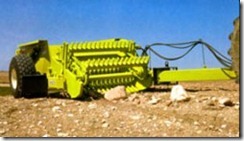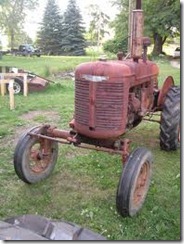The iron fork that rakes the ground and sweeps head-sized stones into a steel bucket has the grace of a pump jack. But many are the spines those tines have saved. The power take-off driven, hydraulic-ram rock-picker, is an enviable machine to which our farm would never aspire.
The power take-off driven, hydraulic-ram rock-picker, is an enviable machine to which our farm would never aspire.
Instead, the stone boat that pitches over the summerfallow; the crowbar that bounces between orphaned rocks; the chain in a heap at my feet, the skinny-frame Farmall tractor that pulls the whole lowly enterprise; these are my tools for rock picking.
I sit on this parody of a tractor as it chuffs up the stony west hill on the farm by the river. Not much  grows at the balding crest of this rise. The soil is grey-wooded and light and the rocks are legion. The joke about raising a fine crop of stones, appropriate. Still, somewhere in my father’s eyes, there’s imagination enough to see a swaying crop of Bonanza barley on these few elevated acres.
grows at the balding crest of this rise. The soil is grey-wooded and light and the rocks are legion. The joke about raising a fine crop of stones, appropriate. Still, somewhere in my father’s eyes, there’s imagination enough to see a swaying crop of Bonanza barley on these few elevated acres.
I stop on top the hill, wrench a rock from the till and roll it on the boat. I sink the crowbar down beside another, find a side, pry and work it loose. It’s too large for the stone boat. I dig with my hands and expose its granite edges, then wrap the chain around it. I secure the sling hook to a link on the other side of the rock and hitch the chain to the shackle on the drawbar. The Farmall tires dig in, it’s pulled free. The big rock creates a channel to the edge of the field, where I stop to unchain it.
Back on the hill I try to pry up another. A larger one. I plunge the bar into the soil as far as I can on one side, but can’t find boulder’s bottom. I take crowbar-soundings on the other side and get an outline. But rocks here can lie like icebergs.
Excavating a partial side I loop the chain around what seems to be half the boulder. My thinking is to turn it, discover its mass, then consider its deportation. On the tractor I find first gear, max the throttle and inch out the clutch. The chain stretches, slips, springs back and slaps the back tire hard. Second attempt, same result. On third try I dig farther down and find a steeper pitch, now the chain has good purchase; I ease out the clutch, tires spin, grip, Farmall stalls. Fire up a fourth attempt–same result.
I leave the rock to rest. Outguessed by this erratic, but satisfied with the essay. As far as I know that rock was never moved, could not be moved, is still there in the lithosphere enduring every earth and crop rotation. Perhaps, in the fullness of time, it will be exposed. For here on the farm, the paleogeological force of covering up works in the reverse.
We may come to know its age, its journey, why it’s chinked in here, holding up a wall of horizontal earth. We’ll use the proximate small ones to explicate the big one. With method and good guess work we’ll add to the stone fence of knowledge that runs alongside the field and frames that hill and that rock.
There was a time when I cursed the stone of the Great Plain. My back aching hard at night, my mind roiling with dreams—a sedimentation of bitter spar and fieldstone, the aggregate always eluding my absolute grasp.
But I’ve seen the big back-saving machine as it paws and mines, and misses the story for the structure. Mistakes the grey hill for its kingdom and the ageless rock for its own reflection.
Now I’m content to sleep in stony arms, wondering and marveling at the erratic, understanding that a mystery explained, so-called, leaves too large a hole in a field.

Very nice. As always when I read your blog, I’m filled with a bittersweet sense of homesickness.
“A mystery explained, so called, leaves too large a hole in a field” Beautiful metaphor. Didn’t even pick up on it until this line at the end. Absolutely Lovely Dad.
Many many thanks Michael! Very happy for your reading.
I agree with Michael. That is a powerful metaphor. I was too taken up with memories of back-breaking work at first (I’m still convinced that Dad didn’t want any of us to become farmers so he made us pick rocks!)